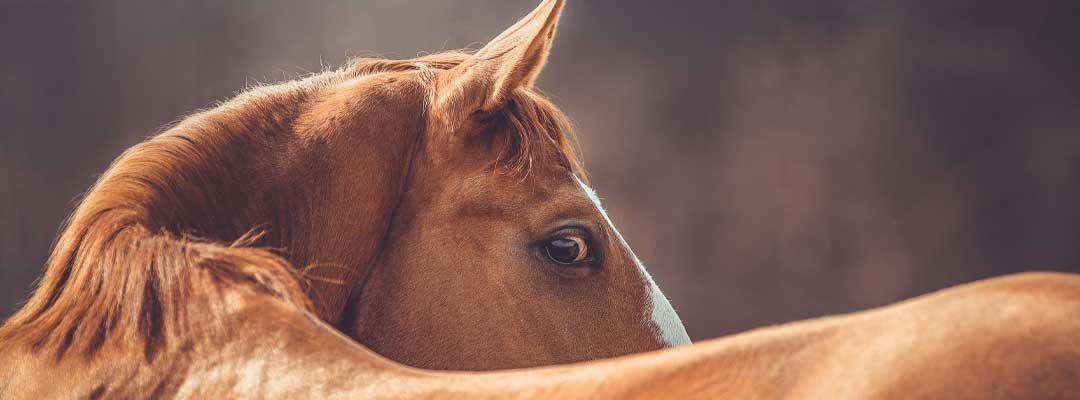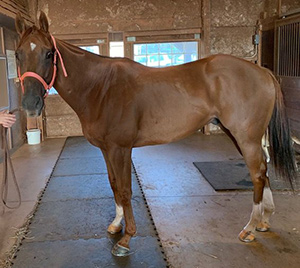Understanding The Risks and Signs of Ulcers in Horses
Most performance horses are at risk for ulcers. How familiar are you with the signs of equine ulcers and the preventive measures to take?

Ulcers impact 60% of show horses and 90% of racehorses, according to American Association of Equine Practitioners. But racehorses and performance horses are not the only horses at risk for Equine Gastric Ulcer Syndrome (EGUS). The painful condition can affect all horses, regardless of age, breed or riding discipline. Equine stomach ulcers are caused by excess stomach acid, which horses often produce as a result of stress, among other factors.

Nelda Kettles knows the signs of ulcers in horses like the back of her hand. Alongside her husband Larry, Nelda co-owned and operated CK Running Horses for more than 30 years, and after breeding and raising Thoroughbred racehorses, they wanted to give back to the industry. Together, they founded the Thoroughbred aftercare organization, Horse and Hound Rescue Foundation, which to date has found homes for more than 300 off-track Thoroughbreds.
"The statistics of ulcers are frightening. Some 90% of horses coming off the track have ulcers,” said Nelda. When Kentucky-bred Bluegrass Bronco --- a war horse with 38 starts under his girth --- arrived to Horse and Hound Rescue Foundation, “He was suffering from ulcers so badly, you could touch his side, and he would start bucking --- he was not happy,” said Nelda. “We immediately put him on UlcerGard. He was adopted out to an equine veterinarian who continues to keep him on UlcerGard [for prevention of equine ulcers].”
By preventing equine ulcers, “The weight comes back, and quickly you see a world of difference,” said Nelda. “Ulcers in horses can be frustrating, but when they are taken care of, it’s like night and day. Horses are happier. They eat better, gain weight and have a better disposition overall."
FREQUENTLY ASKED QUESTIONS ABOUT ULCERS IN HORSES
Can equine ulcers impact a horse’s competitive performance?
For a closer look, one animal health company conducted a study examining 84 horses with ulcers. Some 77% displayed poor performance, resulting in loss of jumping style, resistance to dressage work and training, stiffness and lack of response to a rider’s leg. When asked if a horse’s performance can be impacted from ulcers, Nelda says, “There is absolutely a difference in how horses perform. Nobody wants to run with belly ache, and ulcers definitely give belly aches and affect a horse’s competitive spirit.”
What causes ulcers in horses?
Equine Gastric Ulcer Syndrome is most often the direct result from physical stress and behavioral stress. The list below outlines examples of both stressors on horses, some of which are commonly experienced among performance horses competing in any discipline.
Physical stress:
Behavioral stress:
What are signs of ulcers in horses?
Horses can react to gastric pain in a variety of ways.
Irritability while being groomed, changes in attitude, resistance while being tacked up or under saddle, and stress-related habits like cribbing can be signs of gastric ulcers. But, so often these signs are dismissed as “bad behavior.” Ulcers could be the cause. Is your horse displaying any of these behaviors, or the common signs of ulcers in horses outlined below? If so, you may need to talk with your veterinarian.
How are ulcers in horses diagnosed?
Proper diagnosis is crucial for fast, effective treatment of ulcers in horses. A gastroscopic exam allows your veterinarian to examine the inside of the stomach and to definitively diagnose equine ulcers. If an ulcer is found, your horse may be prescribed an approved omeprazole for horses paste for treatment, and recommendations may be made for environmental and management changes that can help prevent ulcers in the future.
How do you prevent and treat ulcers in horses?
Equine ulcers can be prevented through three different methods that include reducing stressors, altering feed strategies and through trusted medications.
To help protect your horse from developing equine ulcers, administer UlcerGard for horses 48 hours in advance of stressful situations, such as:
“Through the Right Horse Partnership, we received a donation of UlcerGard, and we were in seventh heaven. We had enough of the product to put all of the horses on it here,” said Nelda. Preventing ulcers is an important part of your horse’s overall health program. Help protect your horse from equine ulcers.
Veterinarian-founded Valley Vet Supply is your one-stop shop for your horse’s every need, from ulcer prevention and other equine medications, to English and Western tack, and more.


